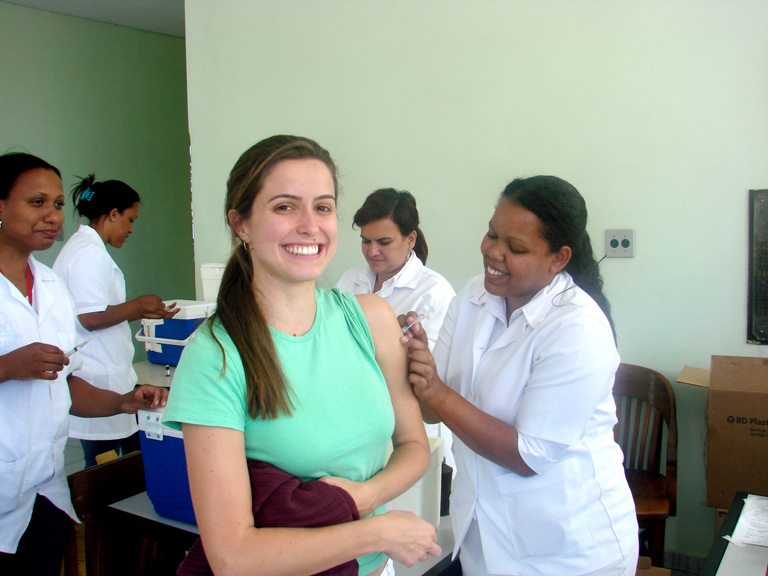The Battle to Improve Vaccine Access in Brazil

During the pandemic, many governments have worked independently and together to combat the virus and provide vaccinations for citizens in their states. However, Brazil has proven itself to be an exception, as vaccine access for Brazil was incredibly limited due to the president’s resistance. However, as of June 2022, 80% of the population is now vaccinated, and this rate is higher than the world average.
How President Bolsonaro is Infringing on Vaccination Rights and Access
Brazil operates on a universal health system that guarantees public access to necessary vaccines. In fact, vaccination rights have constitutional protection and the government has a legal duty to ensure them. As in all other countries, the circumstances that the pandemic caused generated an urgent need for vaccines, requiring a rapid, planned response by government authorities. However, President Bolsonaro failed to make COVID-19 mitigation a political priority throughout the country. He turned his back on science to endanger the health and lives of Brazilians and adopted policies that placed their health at great risk. One of his main methods involved spreading false information about COVID-19.
President Bolsonaro also opposed social distancing, refused to wear a mask, and regularly shook hands with his supporters. His ultimate goal was to achieve herd immunity in Brazil by allowing the disease to spread. Additionally, he deliberately refused to follow WHO recommendations and sought to block officials from following COVID-19 mitigation guidelines, vetoing legal mask mandates. President Bolsonaro’s failure to prioritize the health of his citizens shows his disregard for human rights amid a global pandemic. Thankfully, however, other actors were eager to take this task into their own hands.
ANVISA’s Crucial Role in Vaccine Access
Now, more than 80% of the Brazilian population has received COVID-19 vaccines. These vaccinations have undergone successful distribution through the National Immunization Program. Yet, distributing these vaccines was not easy — rather, President Bolsonaro’s neglect of public health guidance made distribution more complicated. The main actor behind vaccination distribution was ANVISA, the Brazilian Health Surveillance Agency. ANVISA works with the Ministry of Health, which is responsible for controlling and regulating health-related products in Brazil.
The Ministry issued several regulations to enable the distribution of emergency vaccines, but it lagged in its development of a national COVID-19 vaccination plan. Thus, ANVISA took matters into its own hands and negotiated vaccine access for Brazil with willing and available manufacturers. However, the Ministry’s standstill is understandable, considering President Bolsonaro’s eagerness to undermine the pandemic and the fear that officials would receive negative retaliation for combatting the virus. Because of this fear, the ministry lost the trust of many Brazilian citizens. Therefore, ANVISA was able to quickly gain public trust and vaccine access for Brazil because of its administrative independence, financial autonomy and the stability of its leaders and technical personnel. Additionally, it gave scientifically supported and unbiased solutions and technical decisions.
ANVISA’s role has proven to be incredibly crucial. It has issued emergency regulations and analyzed requests for the emergency use of vaccines, demonstrating its thought processes through open, public meetings. ANVISA presented every decision to the Brazilian community, which increased public trust in the approved vaccines.
Struggles to Access COVID-19 Vaccines
Acquiring these vaccines was difficult, as one of the only allowed options was the Sputnik V vaccine, which initially did not receive approval from ANVISA and therefore could not be imported to and used in Brazil. In the meantime, ANVISA worked with local Brazilian governments to negotiate for vaccine access and advance other non-pharmacological efforts to control the pandemic and spread trusted and accurate public health information. Some of these efforts included partial lockdowns and social distancing, for example. These efforts generated more public trust, which paved the way for the eventual vaccination campaign.
ANVISA’s technical performance and consistent course of action eventually assisted local governments in importing safe, effective vaccines and increasing community trust in products, thus improving vaccine access for Brazil. One such process involved giving the Russian COVID-19 vaccine a chance, despite concerns because otherwise, there would not be enough vaccines. Despite safety concerns, ANVISA allowed Sputnik vaccines into Brazil, importing 928,000 doses. Even though this is just a fraction of the total that Brazil requested, it went a long way. However, importing the Sputnik vaccine meant that stringent measures to monitor the vaccine’s safety had to undergo implementation.
Now, Brazil can selectively import vaccines that specific countries have approved for emergency use. It is now restricting Sputnik imports and monitoring them closely. Only healthy adults are eligible for the Sputnik shots and vaccine distributors within Brazil must specify that the vaccine is a Sputnik vaccine.
Conclusion
The COVID-19 pandemic revealed, overall, that Brazil’s federal government was not ready to deal with an international public health emergency — a lack of governance and political influence over science prevented the Ministry of Health from vaccinating the country, but thankfully, ANVISA’s consistency in action assisted local governments in eventually vaccinating most of the country. This demonstrates the cruciality of administrative autonomy in organizations and the abilities that such organizations have in implementing policies and actions that help preserve the health of an entire country.
– Shiloh Harrill
Photo: Wikimedia Commons
